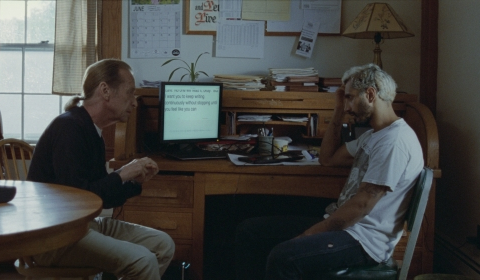Former addict and heavy metal drummer Ruben’s life changes in a day when he realizes he has lost his hearing. With remarkable sound design, Sound of Metal offers insight into the Deaf community while depicting Ruben’s journey of loss and acceptance.
By Seda Saygili and Walter Zeno Munoz
It is strange how the life we live is hanging by a thread. Darius Marder’s Sound of Metal makes this painfully obvious: everything in the movie happens suddenly and quickly. Marder both wrote and directed Sound of Metal, which revolves around the challenges faced by young metal music drummer Ruben who suddenly loses his hearing. The only thing that can help him are expensive cochlear implants which his insurance doesn’t cover. He is portrayed by Riz Ahmed, the first Muslim actor to become a nominee for Best Actor at the Academy Awards. The film received awards for Best Sound and Best Film Editing.
When the audience first sees the blonde hair of Riz Ahmed, his look reminds of Ryan Gosling’s portrayal of a stunt motorcycle rider who turns to criminal activities to support his family in The Place Beyond the Pines: same style, hair and even the tattoos that cover his whole body. The similarity is not coincidental: The story of Sound of Metal was written by Derek Cianfrance, the director of The Place Beyond the Pines. Darius Marder, who was also one of the screenwriters of The Place Beyond the Pines, is co-working with Cianfrance again in his latest feature film.
Standards of NormalSound of Metal brings Deaf people as an often-marginalized community into the focus of our attention. Darius Marder doesn’t ask for our pity but rather allows us to empathize with them as human beings. Their Deafness isn’t so much an impediment as it is a distinctive feature of their existence. Joe, who lost his hearing during the Vietnam War and runs a shelter for Deaf people with the support of the church, expresses the motto of the people who live under this roof:
Everybody here shares the belief that being Deaf is not a handicap. Not something to fix. It’s pretty important around here.
Most people are used to thinking about Deafness as a disability. This is not surprising given the role of cultural normative standards which dictate that being able to hear is normal, while any deviation must be corrected. This movie can also interpreted with the medical and social model in disability studies. In the film, Ruben symbolizes the mentality of the medical model which sees disability as something to be cured whereas in the social model which Joe represents, it is believed that society’s response and treatment of people with impairments mainly shape the concept of »disability«.
Constant ChangeRiz Ahmed’s performance in Sound of Metal is one of the finest in his acting career. He is surrounded by a compelling cast including Paul Raci as Joe whose role has gained him the nomination for Best Supporting Actor at the Academy Awards. Besides Paul Raci, Ahmed’s partner Lou, a reckless heavy-metal singer, is performed by Olivia Cooke, who might be familiar to viewers from Me and Earl and the Dying Girl (2015). In addition to this, the casting of actually Deaf people such as Lauren Ridloff as a teacher grants authenticity to the movie.
 Paul Raci as Joe and Riz Ahmed as Ruben. Photo Credit: Amazon Studios
Paul Raci as Joe and Riz Ahmed as Ruben. Photo Credit: Amazon StudiosThe movie’s main concern remains somewhat opaque. Is it about the power of empathy and sympathy? Hope and hopelessness as a yin and yang of human lives? Dealing with the unexpectedness of each second? Probably all of them. As a viewer, we become witnesses of what Ruben lives through as the movie closely follows his experience. When he first becomes a member of the community that Joe leads, he doesn’t understand the sign language people use around him.
The film doesn’t provide subtitles for these scenes. This seems an intentional choice to allow audiences to empathize with Ruben. It’s only when he learns to sign language that the audience can follow the conversation in the subtitles. When Ruben finally is able to pay for cochlear implants by selling his RV and musical equipment, in the very scene after the surgery he hears a metallic-like buzzing noise. Marder uses muffled sounds such as this from time to time in the film to allow viewers to share the protagonist’s auditory experience. This is a spectacular technique that engages the audience directly.
Parting of WaysThe depiction of discomfort, disturbance and imperfection of the operation as well as the transformation that Ruben goes through are beautiful. Nothing in the movie is exaggerated or fake, but instead quite genuine. Sound of Metal reminds us of life as a state of flux. This idea of continuous transformation can also be seen in Ruben’s relationship with his girlfriend
Movie Info
USA 2020
120 minutes
Director: Darius Marder
Starring: Riz Ahmed, Olivia Cooke, Mathie Amalric, Lauren Ridloff, Paul Raci, and others
Either through choices or worldly contingency, our lives are constantly being transformed. This is neither hopeful nor hopeless. It is something in between. The way humans cope with it is what makes the difference. The movie ends abruptly, posing a question to the audience: What would you do? Try to fix it or learn to live with your ›loss‹?















